In order to discuss Socrates‘ type, there are two things for us to mention before we can start:
(1) Socrates never wrote anything himself. Thus, what we do have on him, we have from three sources: Aristophanes, Plato and Xenophon. The puzzle of piecing together a picture of the “true Socrates” from these sources is known as the Socratic Problem. It cannot be completely solved, but nor are we are far from powerless in furthering a solution to it. From Aristophanes we know next to nothing. From Xenophon we have a great deal of Socrates’ advice to the young. Yet the problem is that most of this advice is quite banal. – If Xenophon’s picture was all there was to Socrates, there would have been no reason for the trial and execution of Socrates. Thus we are left with Plato’s sources: These are divided into the early, middle and late works, with the early work thought to represent the true Socrates, the middle works representing a mixture of Platonic and Socratic thought, and the late works being almost wholly the words of Plato, stuck into the mouth of Socrates. (So this also means that late Platonic works such as the Republic and the Laws cannot be used to type Socrates at all.)
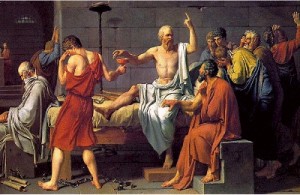
(2) Within the field of psychological type there exists a strong, yet continuously challenged, tradition of typing Socrates as INTP. This tradition has been especially expounded on by David Keirsey, author of the best-selling Please Understand Me book series. Also, a lot of INTPs around the net like to “claim” Socrates and will defend him as INTP no matter what arguments are presented to them. (But of course, not all INTPs are beyond redemption, as one INTP states online: “I used to think INTP, but he just seemed to love talking so much and refused to write anything down. I sometimes wonder if his seeming INTPness comes from Plato…”) – Alas, we cannot convince everyone, but we can present our arguments and let you decide for yourself. Here we go:
Argument 1: Socrates died talking and died of talking
The last hours of Socrates were spent in the company of his friends, discussing philosophy and the possibility of the soul being immortal. In the dialogue portraying his last hours, Socrates even tried to keep talking after the hemlock was killing him off. And of course, the reason Socrates was condemned to death in the first place was because he had been unable to keep his mouth shut about the sore spots of the Athenian self-identity. As a later Roman, Cato the Elder, said of Socrates: “Socrates was a big chatterbox, who tried … to dissolve [Athenian] customs, and to entice its people to forming opinions contrary to order.”
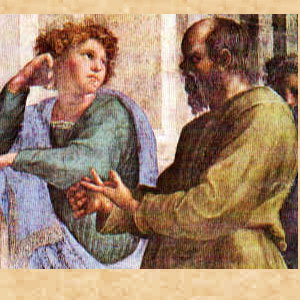
Generally speaking, though all types can benefit from stimulating conversation, an INTP will be more inclined to pursue their own ideas and also to remain with those same ideas for prolonged periods of time. For example, Einstein, Darwin and Kant all worked on their ideas until they were well thought-out, whereas Socrates constantly sought stimulation from the outside, from fellow men, and endeavored to solve everyday problems in an abstract and surprising, ‘maverick’ manner which was not always completely tenable. Socrates even seems to have taken delight in the half-baked nature of some of his utterances. As Socrates says in the Theaetetus: “Even though everything you and I uttered today was but brainfarts, still we will be better the next time we try to reason, as a consequence of todays meanderings.”
To further the case for Socrates as a person with a heightened need for external stimulation (and thus, for Socrates as an Extrovert), I advance another two quotes:
Socrates: “The arguments never come out of me; they always come from the person I am talking with.”
Socrates: “[I have an] advantage in having the skill to get some account of the matter from another’s wisdom and entertain it with fair treatment.”
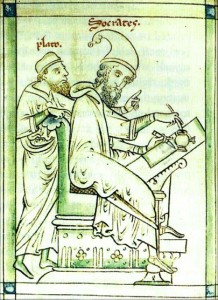
In my opinion, these two quotes testify towards an outwardly directed psyche, characterized by a quick understanding and adept at manipulating the ideas of others. To the true MBTI nerds reading this (i.e. the ones with an understanding of the Jungian Functions) what he have just described is an Ne dominant psyche. To the not-so-nerdy readers, Ne stands for Extroverted iNtuition and is only dominant in the ENTP and ENFP types. What these two types are known for is in fact their capacity for quick and numerous associations, and in the course of delivering the short defence speech at his trial, Socrates gets around to likening himself and others to both Hercules, the Illiad, Achilleus, and more. Furthermore, on the topic of Socrates’ extroversion and his trial, we note that as introverts, INTPs tend to prefer predictability in their outer environments and relations, while ENTPs are noted for their recklessness. As will be clear to anyone reading the trial, Socrates makes no attempt to make amends, but openly taunts his jurors, the politicians of Athens, and so on.
Argument 2: Socrates’ philosophical doctrine was extensive, rather than deep
As we have already mentioned, both Plato and Xenophon thought that each was the true heir to the philosophy of Socrates, even while their two philosophies were radically different and had almost no points of contact. But the buck did not stop there at all: After the death of Socrates, several philosophical schools sprang up, each claiming to be the true heirs to the philosophy of Socrates: At least four different schools of this kind can be identified:
(1) The Cynics The Cynics were a school of philosophy who admired Socrates for his high spirits, while living life in utmost poverty. Through the absence of worries over one’s possessions, one’s life and personal safety, one could be truly free, they thought, and who was freer than Socrates?
(2) The Stoics admired Socrates for his stern courage in battle (Socrates fought as an infantryman on numerous campaigns), as well as for his unfailing resolve and calm, even in his dying hour. The Roman stoics of the first century CE often sought to emulate Socrates when they committed suicide, thinking that none were sterner than Socrates – the true example for all Stoics.
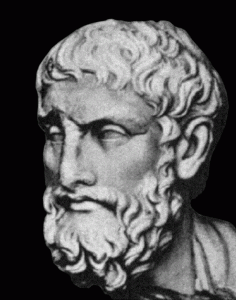
(3) The Epicureans thought that Socrates was truly wise, because even though he lived in poverty he still did not reject the pleasures that were available to him. Thus, while the Cynics made the choice of living in abject pain and without bare necessities, the Epicureans sought a rational optimization of their lives: If they were to gain the greatest pleasures available to humans, they would have to spend their lives working and thus possibly end up enjoying life less than if they simply struck a rational balance between pleasure and pain: Sausage may be better food than bread, but if you have to work 12 hours to pay for sausage, is 12 hours of work eating sausage really better than 12 hours of leisure eating bread? The Epicureans looked to the poverty-stricken yet happy Socrates as their true model of how to achieve this optimum balance of maximum pleasure and minimal pain.
(4) The Skeptics looked to Socrates for a man who was able to examine almost everything under the sky and still suspend final judgment. The Skeptics made an art form of viewing any matter from (at least) two sides, and to continuously keep doubting the nature of most knowledge. A Skeptic was one who found peace by admitting to ignorance and seeming to abandon the criterion by which knowledge is gained – like Socrates, who kept maintaining that he never had any ideas himself – that he was completely barren and only a midwife to the ideas of others.
All of these four schools of philosophy looked to Socrates as their true master and each of them maintained that they were the true heirs of Socrates. That there can be such widespread disagreement as to what Socrates actually thought testifies to the fact that Socrates’ teachings were extensive rather than deep (an Extrovert trait) as well as to the fact that Socrates’ teachings were preliminary rather than finalized and ready to fly (an Ne trait).
Argument 3: Socrates displays the characteristics of the anti-social personality
In the work of the famous psychologist Theodore Millon, each of the 15 personality disorders are compiled into a pathologic personality type. This allows the reader acquainted with both systems to draw parallels between the MBTI and the “dark side” of personality. While there is no 1:1 correlation between MBTI type and Millon-type, there is in fact a meaningful correlation. In my experience, while INTPs will most often be Eccentric/Schizotypal in Millon’s system, and ENFPs will most often be Sociable/Histrionic, ENTPs, however, will tend to qualify as Nonconforming/Antisocial. In and of itself, this argument will not prove that Socrates was ENTP, but it will add to the likeliness. Here is Millon’s mind-map for the Nonconforming/Antisocial personality:
Which we will now contrast with the typical Millon type for INTPs, the Eccentric/Schizotypal type:
Hopefully, most readers will agree that Socrates fits better into the first of these two mind maps. Looking at the two, it is quite hard to see what is at all good about the Eccentric/Schizotypal type. But in fact, the Eccentric/Schizotypal type is second to none in the domains of logic, mathematics and natural science. Like INTPs, the Eccentric/Schizotypal type tends to repress Feeling and sociability and thus deliver the great leaps forward that is the signature of a Parmenides, a Descartes or a Smith. Whereas Socrates, by contrast said that: “The arguments never come out of me; they always come from the person I am talking with.”
Amongst the stock characterizations of the Nonconforming/Antisocial personality is the tendency to thrive on conflict and confrontation. The Antisocial personality is, amongst other things, known for its uncanny ability to sense the soft spots of others and then jerk the knife into them. As one psychologist wrote: “In the mind of the antisocial, they are doing people a service, confronting them with the truth and with their blind spots. In the minds of everyone else, the antisocial is simply overly confrontational.” Again we note that while these traits are certainly possible in INTPs, they are far more common in ENTPs. But just to set you off, I’ll give you two examples of Socrates exhibiting this behavior:
(1) As we noted earlier, Socrates openly taunts his jurors and the politicians of Athens in his defense speech. Socrates also compares Athens to a mighty horse and then compares himself to a gadfly that constantly stings the horse so as to make sure that the horse is always vigilant. This is more or less the prototype of the antisocial behavioral pattern described above.
(2) In the dialogue Meno, Socrates forces a slave boy to solve a simple geometry puzzle which, having no education, the slave cannot solve properly. Socrates keeps asking the boy questions, while his friend Meno looks on, until the slave concedes that he does not know:
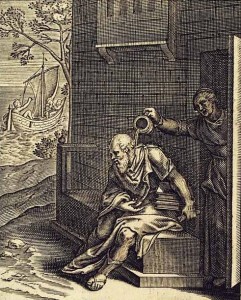
BOY: Indeed, Socrates, I do not know.
SOCRATES: Do you see, Meno, what advances he has made in his power of recollection? He did not know at first, and he does not know now … but then he thought that he knew, he answered confidently as if he knew, and had no difficulty; now that he has had a difficulty, he neither knows nor fancies that he knows.
MENO: True.
SOCRATES: Is he not better off in knowing his ignorance? … If we have made him doubt, and given him a shock, have we done him any harm? (…) We have certainly, it would seem, assisted him in some degree to the discovery of the truth; and now he will wish to remedy his ignorance.
Thus, here it would also seem that Socrates is taking pride in being ‘overly confrontational’, and furthermore, Socrates portrays himself as a firm believer that this sort of confrontation is one that does people good.
So Socrates was not only ENTP, he was also an antisocial bastard. Indeed, had Martin Luther King Jr. known this side of Socrates, it remains to be taken up anew whether he would ever have compared Socrates to Jesus Christ.

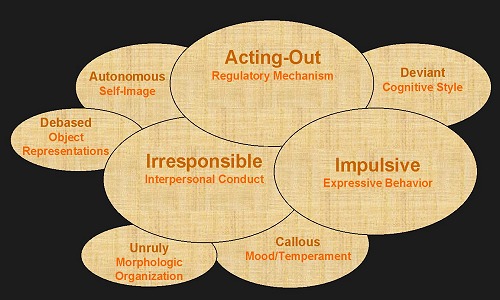
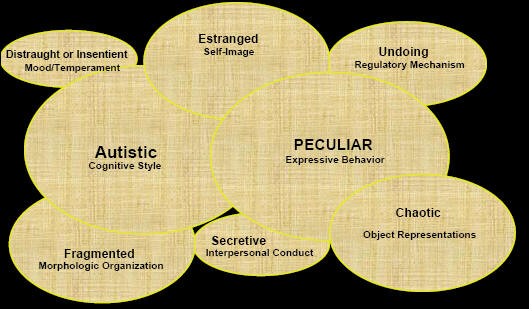
The first argument is how he liked to argue. That’s something INTPs do as well. You seem to believe introverts avoid people at all costs. This is a very limited view. INTPs love to tell people they are wrong as well. In fact, one would think an ENTP would be more diplomatic and come up with much better arguments at his trial.
The third argument is pretty much nonsense and can be ignored. Tell any INTP that they are not antisocial or nonconformist. See how well that goes. At any rate, Millon’s theory is highly suspect and shouldn’t be the basis for typing.
In reality, Socrates was in his head most of the time, ignorant of his surroundings. He would stop in the middle of the street to ponder things. On one occasion he is said to stand all night and at morning’s light he gave a prayer to the sun and simply walked off. In another instance, he was on the way to a social party and stopped to think, showing up halfway through dinner. ENTPs prefer to be stimulated by people and outside ideas rather than in their head.
He dressed shabbily and wore nothing on his feet. He was completely unbothered by cold or any other sense feelings. He lived like a man completely unconcerned with the outside world.
As you can see, this post was written years ago and has since been removed from the main site. However, we still think Socrates is an ENTP. Here are some further pointers and replies to your comment:
re: “INTPs love to tell people they are wrong as well.”
True, but all else being equal, this suggests ENTP more strongly than INTP.
re: “In fact, one would think an ENTP would be more diplomatic and come up with much better arguments at his trial.”
And why would one think that? ENTPs tend to have a lot of trolls on their side, e.g. Machiavelli, Hume, Voltaire and the list goes on.
Socrates’ arguments in the Apology are not seriously analytical; he is trolling the jury and enjoying the sort of far-fetched complete reversal that indicates repressed Si over repressed Fe. In fact, we may say that he does not appear to have repressed Fe in the Apology at all.
re: “In reality, Socrates was in his head most of the time, ignorant of his surroundings.”
Not really. There isn’t any source that says that. It is quite true, as you say, that he would take long spells, standing still and pondering things. All else being equal, this is a fair point for INTP over ENTP. However, the episodes that you mention (standing still all night and not caring about cold) are not serious descriptive pointers to his personality. They are part of a scheme on Plato’s part to portray Socrates as a demi-god who exhibits the four cardinal Greek virtues of moderation, bravery, wisdom, and fortitude. The descriptions follow this schema pretty closely, and contrasts Socrates, who exhibits these virtues, with Alcibiades, who doesn’t. Not without good reason has the Symposium been called “that most literary of the dialogues.”
re: He was completely unbothered by cold or any other sense feelings.”
But all other things being equal, that is actually an argument for extroversion, since introverts – ceteris paribus – tend to be more sensitive to outside stimuli.
Finally, Millon’s theory isn’t “highly suspect” at all and you betray your lack of knowledge when you confuse the anti-social personality style with the adjective of being anti-social in general. However, you are correct that Millon’s theory should not be used to determine the type of someone, as is done in this post. That said, Millon’s theory can provide an overlay for Jungian typology, which will prevent you from trying to stuff everything that is observed about a person’s personality into Jung’s typology, which would be an error as Jung’s typology only describes part of the personality. Knowledge of Millon’s theory (or other theories of personality styles) can therefore help prevent erroneous classifications of individuals in Jung’s system.
Socrates’ argument at the trial can be summed up thusly:
“There’s nothing any of you can do to harm me. You’re only harming yourselves. My inner world of thought is all that matters, and when I’m dead I can continue thinking in the afterlife, but you all have to live with the murder on your hands.”
ENTPs tend to be lawyerly. They would delight in finding a working defensive argument–think of the Sophists, whom Socrates didn’t very much like. Socrates didn’t think he was being very funny at his trial; he simply didn’t care whether he lived or died. In effect, he had a sort of martyr attitude about the trial. An ENTP would see his loss as a disgrace, not an honor.
At any rate, the only reason I commented was because you implied only INTPs can see him as an introvert and only because they feel the need to claim him, and that INTPs refuse to accept good arguments presented to them. And then you gave three rather laughable arguments. As this site indicates, your typing system is rather simplistic and based on a lot of cherry-picking.
I guess typing Socrates depends on which of the many views of him you choose to accept. The description and validity of each view is too complex to address in the comments section of a blog post.
I’d say Aristophanes’ caricature of Socrates in ‘The Clouds’ is most definitely ENTP, but his character is essentially a send-up of all the philosophers of the time, and he resembles an exaggerated Sophist. I think this is the view most non-scholars have of Socrates.
However, most scholars believe that Plato’s Socrates is closest to the truth. This Socrates is a moralist rather than a Sophist, and has somewhat of a prophet’s attitude.
I definitely believe that Ne is the function Socrates extroverts and uses to gather information, often through dialogues with others. However, his discussions are focused on one goal: to discover moral truth, and what “virtue” means.
His Ne is secondary and feeds information to his dominant introverted judging function. He believes there is objective morality, but doubts any human’s ability to achieve it–but that doesn’t stop him from trying! He doesn’t believe the common opinion of virtue is correct, and this is what he tries to tear down in others–and what ultimately gets him in trouble.
However, he does believe you can know things are virtuous (or just, or courageous, etc.) without having a complete understanding of virtue (which apparently only the gods know), which is his ultimate goal nonetheless. In the end, he believed he alone was the best, most virtuous person in Athens, and that it was his mission to make others more virtuous.
It could be argued that Plato’s Socrates was INFP most of all–for his strong focus on morality and the sometimes crude logic in his dialogues. But of course, that could just be Plato’s moralist perspective projecting onto his friend.
Our weighting of Socratic testimonies is:
Tier 1: Plato’s early dialogues.
Tier 2: Xenophon’s portrayal, Diogenes Laertius.
Tier 3: Plato’s middle dialogues, Aristophanes’ portrayal.
As we note, the view that Socrates should be INTP originated with Keirsey. That claim seemed based on a superficial knowledge of Socrates and a reliance on Plato’s late dialogues, where “Socrates” becomes more and more obsessed with definitions and otherworldly virtue. Earlier on, Socrates has also been obsessed with virtue, but in the sense of arête, i.e. general competence and honoring the gods, whereas later it gravitates towards a sort of proto-Christian moral virtue.
Socrates’ crude logic we take to be expressive of Plato’s own tertiary Ti. We are sadly unable to evaluate the nuts and bolts of his logic from the other sources, except some scraps from Xenophon.
In the classical Jungian interpretation we use, a person’s inferior function is highly significant. As another commenter on this site has noted, Socrates’ Fe does not seem to be his repressed function at all. He postures mightily and tends to zigzag between Feeling and Thinking style arguments. This other poster suggested that Socrates almost seems to have Ne, Fe, Ti, Si in some places (and we agree). This image of Socrates is furthermore corroborated by Xenophon’s testimonies.
On the other hand, Socrates could more easily be said to have inferior Si. With tertiary Si, INTPs are typically able to maintain a greater measure of stability and continuity in their personal beliefs than ENTPs are be able to. We elaborate more on the matter here: https://www.idrlabs.com/articles/2013/08/the-difference-between-intp-and-entp/
As such, the type that is “clever, but a little too clever for its own good” is the ENTP, not the INTP. This distinction, remarkably, is also found in Keirsey, but goes all the way back to Jung and his description of the Ne type vs. the Ti type.
Even your own description of Socrates seems to hint at him as a little too clever for his own good: “He believes there is objective morality, but doubts any human’s ability to achieve it – but that doesn’t stop him from trying!”
The Greek that Socrates resembles the most, in our view, is Xenophanes. Not only do the two have a lot in common philosophically (and by inference, cognitively) there is also ample evidence in both cases that while other intellectuals shunned the public and the crowds, Socrates and Xenophanes sought them out to troll them and hold discussions with them. While behavioral testimonies should only be ascribed secondary importance, as opposed to cognitive evidence, this thin red line also serves to set Greeks like Socrates and Xenophanes apart from the sages who contemplated their philosophies in solitude.
1: You don’t indicate how our interpretation of Jungian typology is simplistic, you just state it. So the “joke” is on you.
2: You show a marked lack of knowledge of the broader field of psychology and make objectively wrong assertions about psychology (e.g. Millon). So again, maybe the joke’s on you when you say we are being simplistic.
3: As for your interpretation of the Apology, that, if anything, is an example of Cherry Picking. There are tons of pathos appeals and numerous references to external conditions such as his relationship with specific youths and their parents who can vouch for the merit of his actions and his aim of rendering services to others and to jolt them into vigilant self-examination. Really now, I think we were very reasonable in our first response to you, so your attitude is really not becoming and could do with some Socratic humility.
Can we get a source for this piece?
“In the mind of the antisocial, they are doing people a service, confronting them with the truth and with their blind spots. In the minds of everyone else, the antisocial is simply overly confrontational.”
Would very much like to read in to where that comes from.
Very good review on the subject! Good job!